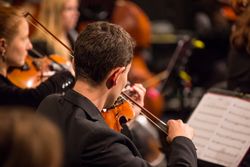
Playing musical instruments by ear is an impressive skill that can take you far when it comes to performing. However, learning how to read music will be beneficial for your playing career. Use this guide to understand why it’s advisable for hobbyists and professionals alike.
3 Benefits of Learning to Read Music
1. Get Back to Basics
Just as addition and subtraction are the basics of mathematics, music notation is the foundation of music theory. By studying music, you’ll learn how a song works and why certain ones have become timeless. Once you grasp basic note reading, you can build on that knowledge to become a more well-rounded musician with the ability to play more advanced and varied reperatoire.
2. Maximize Your Potential
 Being able to read music opens up a whole new world of possibilities and opportunities. Playing an instrument by reading music will allow you to play with more accuracy, and you’ll be able to memorize pieces much faster.
Being able to read music opens up a whole new world of possibilities and opportunities. Playing an instrument by reading music will allow you to play with more accuracy, and you’ll be able to memorize pieces much faster.
Understanding note reading will also give you the opportunity to collaborate with others because you’ll be able to play in larger groups such as chamber groups or an orchestra where instruments are playing different notes and rhythms simultaneously.
3. Compose Your Own Work
Although it’s possible for those who play by ear to produce their own pieces, it’s much easier to compose music by writing it down. Once you’re familiar with reading music, there’s no limit to your creativity. You can draft even the most complicated works and return to them again and again.
If you’re eager to learn to read sheet music, contact The String House in Rochester, NY. This family-owned musical instrument shop has been catering to violinists, cellists, and other bowed stringed specialists since 1970. In addition to renting and selling musical instruments, they’re happy to connect customers with highly qualified teachers. To learn more about their full-service shop, visit their website, or call (585) 442-9272 to speak with a friendly staff member.
About the Business
Have a question? Ask the experts!
Send your question

